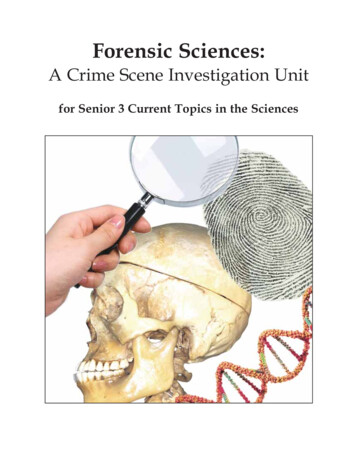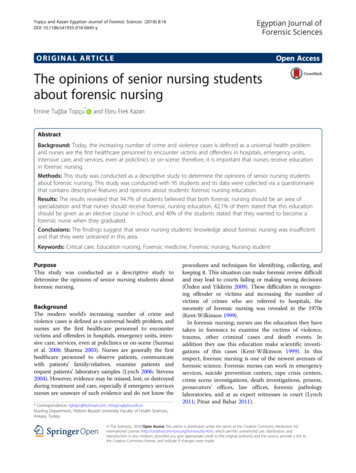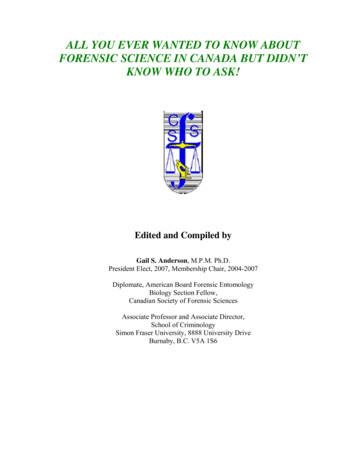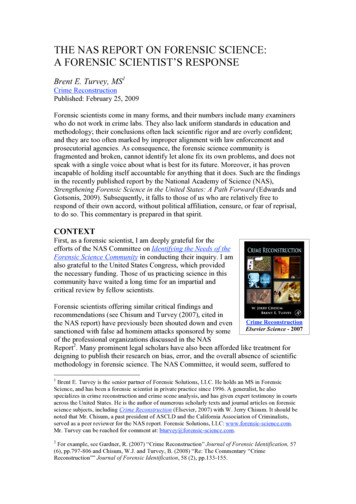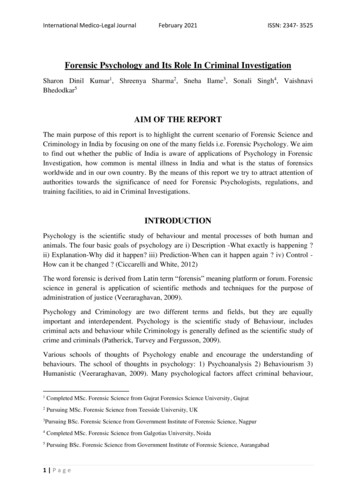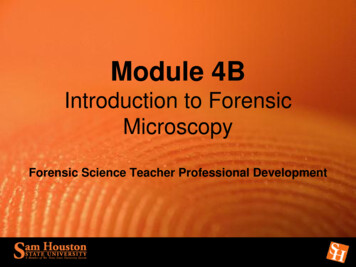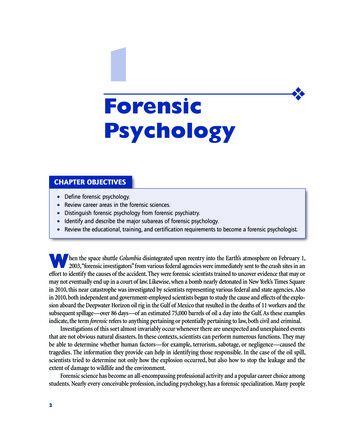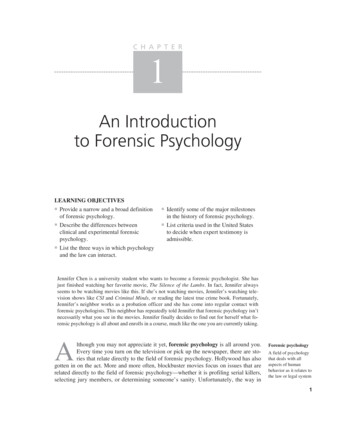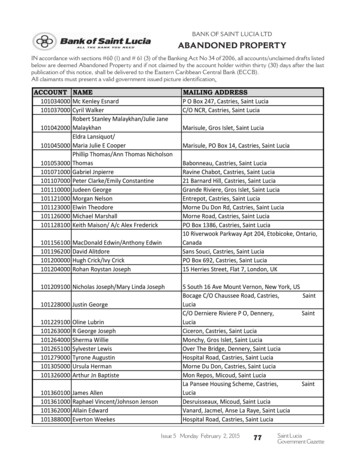
Transcription
Introduction to ForensicPsychology
Definition of Forensic Psychology Dramatic Increase in Popularity Due to Popularity of Television Dramas andManaged Care Obstacles for ProfessionalsNumerous misconceptions about the field:often confused with other forensic sciencessuch as crime scene investigation, etc.
Defining Forensic Psychology First need to define psychologyPsychology is the science that seeks tounderstand behavior and mental processes Psychology is a broad field Most people are familiar with clinical psychology– a specialty and one of the four applied areasrecognized by the APA
Areas of Study in Psychology APPLIED AREASClinicalCounselingSchoolIndustrial/ Organizational sychometricsHealth
Broad and Narrow Definition ofForensic Psychology Broad definition – any application ofpsychological knowledge or methods to a taskfaced by the legal system Includes just about everything from insanity pleasto testifying about the psychological impact oftrade mark infringement
Broad and Narrow Definition ofForensic Psychology Narrow definition – the practice of psychologyas related to the law and legal profession This definition, adopted by the AmericanPsychological Association, focuses on the appliedaspect of the field that is, the practice ofpsychology
Forensic PsychologyversusLegal Psychology Forensic psychology – application of clinical specialties to thelaw Examples: insanity plea, competency hearings, child custody, deathpenalty sentencing, sexual predator evaluations, parole hearings, etc.Legal psychology – experimental areas of psychology asapplied to legal questions Examples: accuracy of eyewitness testimony, size of the jury, effects ofpretrial publicity, trial consultation, etc.
Legal Psychology Consists primarily of the nonnon--applied areas of psychologyaddressing legal questions: nonnon-applied refers to the APA’sdefinition of applied psychology Distinction between nonnon-applied and applied areas ofpsychology Legal Psychology can include Social PsychologyCognitive PsychologyDevelopmental PsychologyAs well as other specialties in psychology
Example of Legal Psychology A developmentalpsychologist may havedetermined that this boyis mature enough to be acredible witness
Legal Psychology Social psychology – study of the individual inthe group Social psychologists can work as trial consultants: research on effects of pretrial publicity, mock jury trialsto test persuasiveness of courtroom strategy,jury selection,witness preparation,this area is discussed in chapter 9 of the textSocial psychologists can also study legal issuessuch as the size of a jury or effects of judge’sinstructions to the jury
Legal Psychology Cognitive psychology – study of humanthought (cognition) Cognitive psychologists serve as expert witness onaccuracy of eyewitness testimony, recoveredmemories and false memory syndromeCognitive psychologists can also conduct researchon ways to improve gathering of eyewitnessevidence
Legal Psychology Developmental psychology – study of changes inbehavior and mental processes over timeDevelopmental psychologists can serve as an expertwitness on how the courts treat children For example, the suggestibility of children’s testimony,ability to make legal decisions such as offering aconfession, and impact of various child custodyarrangements on the emotional health of the childDevelopmental psychologists can also research waysto improve questioning of children or effects ofcustody arrangements
Legal Psychology A legal psychologistmay do a detailed crimescene analysis in aneffort to identify theperpetrator’s“signature” of modusoperandi
The Practice of Forensic Psychology A specialty in the professional practice (applied areas) ofpsychology Applied areas of psychology include clinical, counseling, school, andindustrial/organizational. Most forensic psychologists are clinical psychologists whopractice in the specialty of forensic psychology Large part of forensic psychology involves assessment andtreatment Psychologists are frequently asked to assess an individual on apsycholegal question and then report back to the court, offeringan expert opinion
Examples of common forensicevaluations are: (1) Insanity plea evaluationsCompetency evaluations including: competency to stand trial, civil competency,competency to waive Miranda rights, to offer aconfession, to be executed.Child custody evaluationsDeath penalty sentencing evaluations as in mitigatingor aggravating factorsRisk assessment for individuals about to be releasedfrom prison sexual predator evaluations Dangerousness
Examples of common forensicevaluations are: (2) Suicide risk assessments for inmatesClinical assessment for inmatesFitness--forFitnessfor-duty evaluations for lawenforcementPrePre--employment evaluations for lawenforcement candidatesAssessment of psychological injury forpersonal injury lawsuits
Forensic Psychology:Treatment Provision of treatment in correctional facilities(Correctional Psychology – discussed inchapter 6 of the text)Post--release treatment in the communityPost Sex offender groups, anger management, domesticviolence, drug treatment, etc.Often times this type of treatment is mandated aspart of the conditionalconditional-release
Training and Credentials in ForensicPsychology Most forensic psychologists are clinical (orcounseling) psychologistsPh.D. or the Psy.D in clinical or counselingpsychology with specialized training in forensicwork, usually postpost-doctoral work in the form ofcontinuing education; possibly a forensic internshipor fellowship
Training and Credentials in ForensicPsychology Master-level practitioners – usually provideMasterdirect mental health services withincorrectional or police settings or communitycommunitybased treatment programsAlthough work is available at the master’slevel, credibility increases with the doctoraldegree for work as an expert witness in courtproceedings
Basic skills required beyond theacademic degree Psychological Assessment Skills: intellectual, personality and specialty areas, suchas competency, violence potential, criminalresponsibility, etc. Strong writing skills: Reports to the courts, lawyers, probation officers,etc. Oral presentation skills: Social presence when appearing as an expertwitness
Career Opportunities in Forensicand Legal Psychology Forensic Psychology Full time v. part time work as a practitionerCorrectional PsychologyPolice PsychologyLegal Psychology Work in academic settings as researcher andmentorWork as a consultant to attorneys
Brief Overview of theCourse Topics (1) Ethical Issues in Forensic Psychology Forensic Assessment Clash of psychological and legal professional ethicsDifferences between clinical and forensic assessmentOverview of assessment instrumentsCriminal Responsibility and Competency toStand Trial Evaluations Case lawAssessment instruments
Brief Overview of theCourse Topics (2) Police Psychology Correctional Psychology Selection of law enforcement personnelFitness--forFitnessfor-duty evaluationsCounseling and Peer counselingUnique role of the correctional psychologistAssessment of Psychological Injury Tort LawEvaluation for psychological damages
Police Psychology One of theresponsibilities of policepsychology is to aid inthe selecting policeofficers
Brief Overview of theCourse Topics (3) Child Custody EvaluationsTrial Consultation Jury selectionChange of venue requestWitness preparationCriminal Investigative Techniques Detection of deceptionInvestigative HypnosisCriminal ProfilingPsychological Autopsies
Brief Overview of theCourse Topics (4) Eyewitness Memory and Recovered Memory Accuracy of eyewitness memoryTechniques to improve eyewitness evidenceRepressed memories and false memory syndromeEmerging Trends in the Field of Forensic Psychology Increase growth and sophisticationIncreased cooperation between the two professionsFuture training models in forensic psychologyTherapeutic Jurisprudence
Web Sites American Board of Forensic Psychology American PsychologyPsychology-Law Society www.ap--ls.orgwww.apAmerican Psychological Association www.abpp.orgwww.apa.orgAmerican PsychologyPsychology-Law Student Section www.aplsstudentsection.com
psychology Applied areas of psychology include clinical, counseling, school, and industrial/organizational. Most forensic psychologists are clinical psychologists who practice in the specialty of forensic psychology Large part of forensic psychology involves assessment and treatment Psychologists are frequently asked to assess an individual on a
